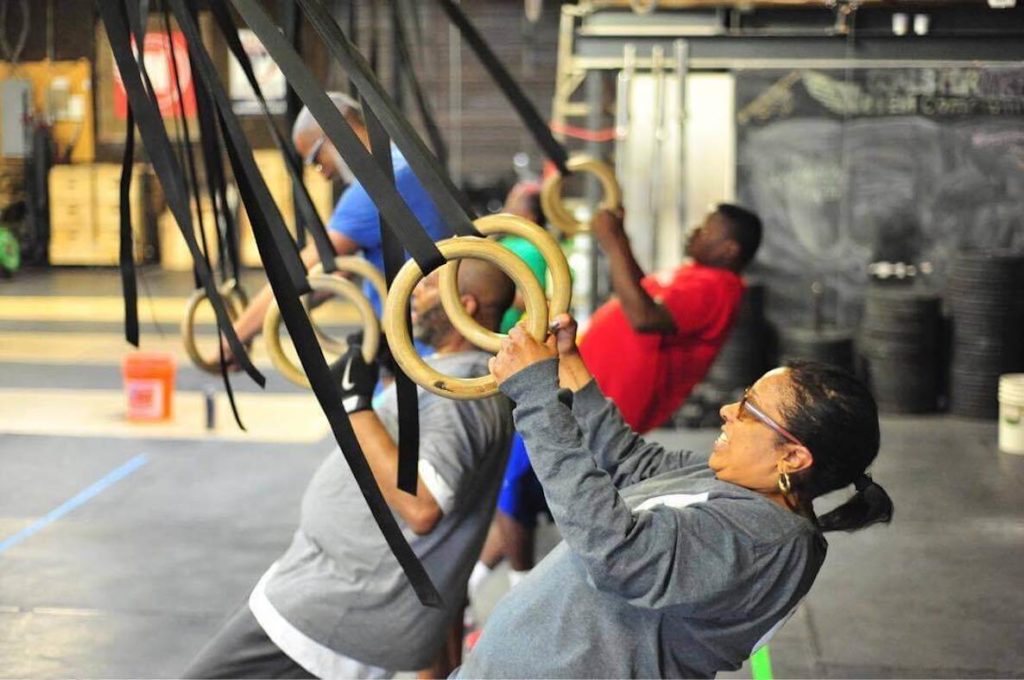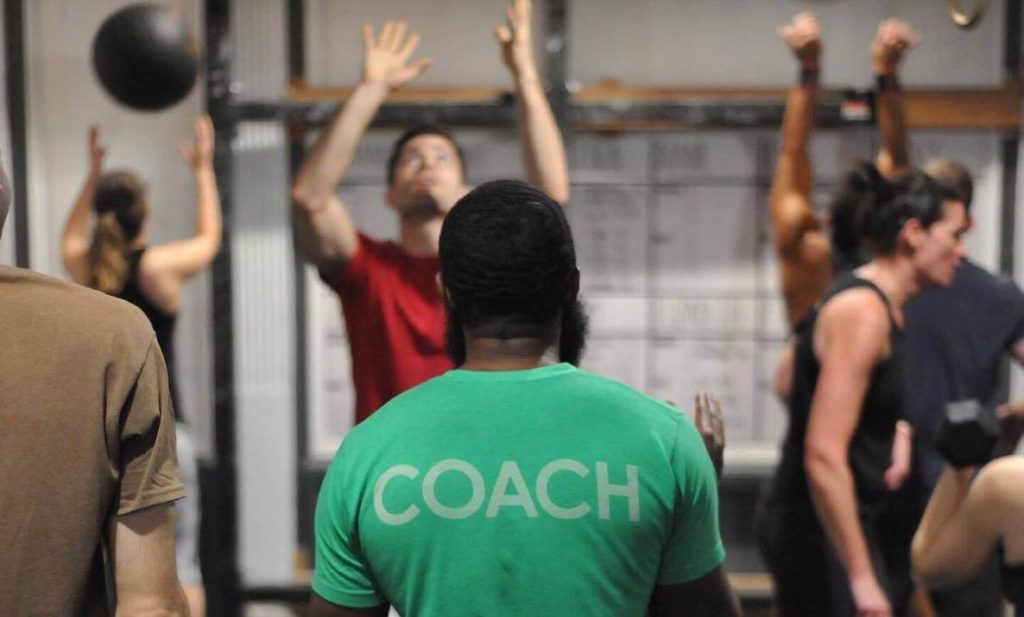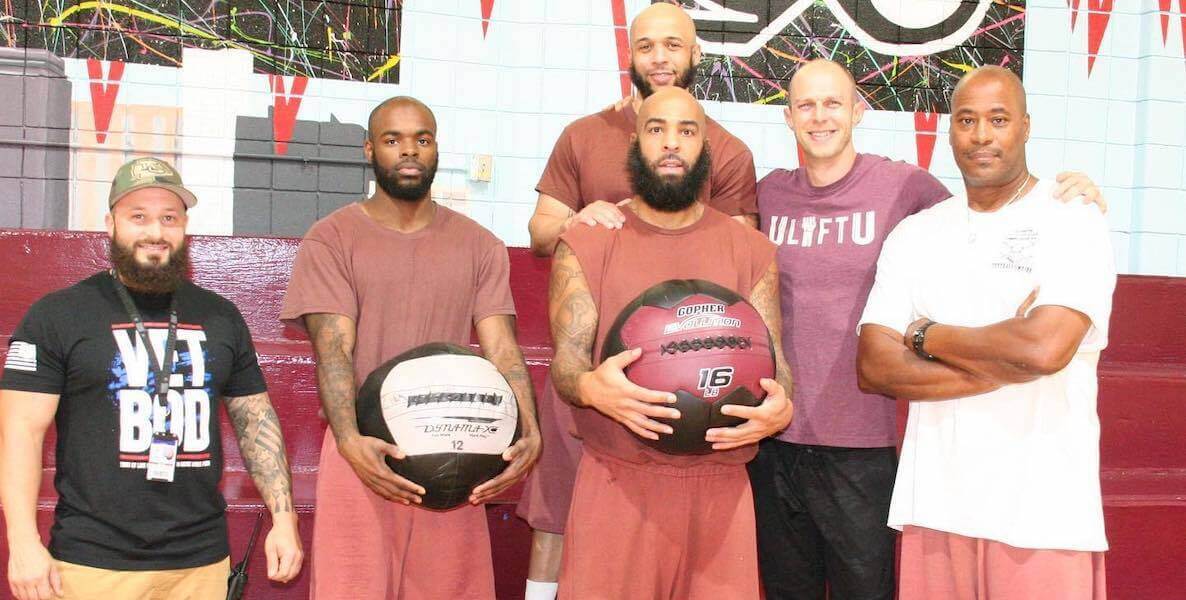It was during Samir Aaron’s 17 years of incarceration that the Philadelphia native first became immersed in the simple but transformative power of exercise. Like so many of the 2.3 million Americans in prison, Aaron discovered that working out is an effective coping mechanism for the stress of incarceration—it stimulates endorphins, fills time and provides an opportunity to mark change, progress and personal growth.
“Working out was my peace of mind,” says Aaron, who was incarcerated at 19 and came home in 2019. “It was my way to challenge myself, set goals, overcome obstacles, see success, and so much more. It became so routine for me that I needed it and when I didn’t work out, it didn’t feel right.”
In 2019, Aaron’s fitness regimen opened up another opportunity. Through a federal reentry program, he was connected with UliftU, a paid certification program in Philly that offers currently incarcerated and returning citizens the chance to make a living providing health and fitness instruction in parts of the city with some of the lowest life expectancies.
“We try to get away from concepts of redemption and try to be more rooted in concepts of liberation, which I think changes the outcome of how we do what we do,” says Belasik. “That’s the difference in our approach.”
ULiftU was founded by Wylie Belasik, a fitness trainer and owner of Subversus Fitness in Center City. He named it to reference the South African concept Ubuntu, which loosely translates to I am because of you, which appealed to Belasik’s belief that there is a unifying need to contribute, to be well, and that not everyone knows how to do that.
“When our craft is done well, it’s more about revealing than it is transforming, and I think that’s really what we’re about,” says Belasik. “We try to get away from concepts of redemption and try to be more rooted in concepts of liberation, which I think changes the outcome of how we do what we do. That’s the difference in our approach.”
Today, Aaron works as a fitness coach at Subversus and teaches exercise classes in his North Philadelphia community, and seeing his work result in people getting fit and improving their health is impactful. “I personally had to transform a lot,” he says. “I can understand that process—and it’s fulfilling to know that you are helping someone with their personal goals, giving someone more confidence within themselves. It’s a big thing that I’m able to go into my community and do that.”
Tackling two goals in one play

Almost a third of American adults have a prior arrest or conviction, and those with a criminal record receive 50 percent fewer callbacks for jobs. The unemployment rate among formerly incarcerated men is as high as 34 percent according to data from 2015, and approximately 27 percent overall, higher than the average unemployment rate for all Americans during the Great Depression.
It was an issue weighing heavily on Belasik. He’d been working in the nonprofit sector and, having participated in endurance sports, marathons, and the Iron Man Triathlon, gravitated towards organizations that incorporated sports in their programs. As he became more deeply involved with the professional side of the fitness industry, he noticed an opportunity: The career path of a fitness coach presented avenues for advancement that were not limited by the specter of a criminal record. And success was defined by one’s connection with clients.
Belasik even had the perfect example of this route to post-incarceration success in one of his friends who had served time and turned his life around after release, becoming a physical trainer. “There was a lot of potential there to write your own ticket, to become self-sufficient, to be economically stable again,” he says.
Belasik established UliftU in 2016 and bought Center City gym Subversus Fitness in 2017—the culmination of his own fitness journey and his desire to help people he knew were being overlooked by many social service organizations.
“It can be really difficult when you first come home, especially from doing a long amount of time,” Aaron explains. “Struggling mentally, trying to balance life, and having those people in your corner that you can go talk to and speak life to you and uplift you—that was really big for me.”
UliftU starts working with people while they are still incarcerated, recruiting those who express a desire to connect with others and make positive community contributions. Participants shadow coaches in the prison gym and receive classroom instruction. Those who have been released are paid $12 an hour while in training. The program takes nine to 12 months to complete, and once they have been certified, a coach’s starting salary is $25 per hour. Coaches run group training sessions for companies and community groups, and also offer personal training services.
The program runs with a staff of five, and is funded primarily through grants but also relies on private donations for between 15 and 20 percent of its budget. It costs a total of $4,000 to train a returning citizen to become a coach—compare that with the $40,000 it costs to incarcerate a person for a year here in Pennsylvania.
 So far, four coaches have graduated, all of whom are employed by UliftU, Subversus, and other gyms. UliftU covers the cost of certification ($500) through a partnership with the ISSA (International Sports Science Association). There are 14 men enrolled in the program who are incarcerated at SCI Chester. (UliftU is open to both men and women, but so far only men have gone through the training.) The program is designed to grow at the same rate as anticipated placement opportunities.
So far, four coaches have graduated, all of whom are employed by UliftU, Subversus, and other gyms. UliftU covers the cost of certification ($500) through a partnership with the ISSA (International Sports Science Association). There are 14 men enrolled in the program who are incarcerated at SCI Chester. (UliftU is open to both men and women, but so far only men have gone through the training.) The program is designed to grow at the same rate as anticipated placement opportunities.
While Covid put a temporary halt to the training program for the currently incarcerated, it resumed mid-September. All other fitness programs—including regular classes at the Diamond Street Recreation Center, Hank Gathers Recreation Center, and soon to be another two rec centers in North and West Philly—continue with pandemic safety precautions in place.
In June of 2021, the organization teamed up with Northeast Treatment Center to launch Ulift-Youth. With support from Steve’s Club, a national nonprofit, Uplift-Youth serves juveniles on probation, teaming them up with UliftU trainees and graduates every week in an effort to set them on a better path.
“I think our organization can help make people whole by providing a path to wellness,” says Belasik. “Both through the jobs that we can hopefully create and through anybody who walks into the door of one of our programs seeking to regain some of their health.”
UliftU’s program highlights how individuals can address structural problems at the neighborhood level. Seemingly complicated barriers to wellbeing, both socioeconomic and physical, don’t necessarily require corporate backing or political action to start breaking them down.
Health and wellness in poor communities

To target the people who can most benefit from the fitness classes and personal training UliftU offers, the team intentionally works in under-resourced Philly neighborhoods that have high rates of chronic disease.
In 2018, the National Center for Health Statistics released its U.S. Small-area Life Expectancy Estimates Project, which revealed how people living on blocks separated just by zip codes have remarkably different health outcomes. In West Philadelphia’s Mantua neighborhood, the average life expectancy was just 66 years, while in Spring Garden, life expectancy is in the high 80s.
The difference? Ninety-seven percent of Spring Garden residents have at least a high school diploma, while one-third of Mantua’s population does not. Other demographic factors that impact the quality of life and health include low income or unemployment, community or family violence, lack of health insurance and race.
The City of Philadelphia’s own 2019 report, Brotherly Love: Health of Black Men and Boys in Philadelphia, highlighted how disparities in education and income combined with crime in the community results in Black men and children with higher rates of obesity, hypertension, and early cardiovascular disease.
The report recommended increased access to preventive health services, promoting healthy living and behavior such as diet and fitness starting in early childhood, strengthening education, and fighting systemic racism to improve socioeconomic conditions.
“It gives us the opportunity to use what some people may look at as a disadvantage as an advantage to help others,” says Aaron. “And that’s powerful, not just for our psyche, but powerful for those kids who may be heading down that path. We were them. We are them.”
While these recommendations are necessary and beneficial, they often fall short when implemented by groups who do not have a trusting relationship with the community they are trying to serve. Conversations about lifestyle changes, health, and wellness are most effective when they are between peers. Though Belasik himself is white and grew up in a rural farming community in Chester County very different from where he now works, UliftU’s goal is to empower people from underserved communities to be the ones initiating that conversation.
When he thinks about the impact his work with UliftU has had, Samir Aaron immediately recounts the first time they invited juveniles who were moving through the criminal justice system into the program.
“We bring them to the gym, we work them out, and we talk to them. We tell them our story because they’re heading on the same path that we were. That was so impactful for me,” Aaron says. “I felt like…all right, this is the meaning, this is it for me. It gives us the opportunity to use what some people may look at as a disadvantage as an advantage to help others. And that’s powerful, not just for our psyche, but powerful for those kids who may be heading down that path. We were them. We are them.”
The Citizen is one of 20 news organizations producing Broke in Philly, a collaborative reporting project on solutions to poverty and the city’s push towards economic mobility. Follow the project on Twitter @BrokeInPhilly.
![]()
MORE ON PROBLEM-SOLVING THROUGH SPORTS AND FITNESS



